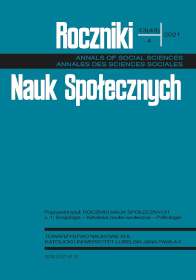Determinants of Choosing a Private Primary School by Middle-Class Parents. Selected Contexts
Abstract
The aim of the article is to present selected conditions and consequences relating to the choice of a private primary school by middle-class parents. The article provides considerations on the importance of choosing a private primary school for the child’s further life. The second part of the text refers to the analysis of qualitative research related to the choice of a private school by middle-class parents. The interviews were conducted in 2015 with 24 parents using the offer of private schools. Analyzes of parents’ statements show that with the choice of a private school, students and their families are selected simultaneously in the social and educational environment. Choosing a private school is an investment in children’s social capital.
References
Ball S. J. (1997), On the Cusp: Parents Choosing Between State and Private Schools in the UK: Action Within an Economy of Symbolic Goods, International Journal of Inclusive Education, 1(1), s. 1-17.
Ball S. J. (2003), Class Strategies and the Education Market: The Middle Classes and Social Advantage, London: Routledge.
Ball S. J. (2006), The Risk of Social Reproduction. Middle Class and Education Markets, [w:] S. J. Ball, Education Policy and Social Class: The Selected Works of Stephen J. Ball, London, New York: Routledge, s. 267-274.
Ball S., Bowe R., Gewirtz S. (2006), Circuits od Schooling. A Sociological Exploration of Parental Choice of School in Social Class Contexts, [w:] S. J. Ball, Education Policy and Social Class: The Selected Works of Stephen J. Ball, London, New York: Routledge, s. 159-175.
Becker G. S. (1990), Ekonomiczna teoria zachowań ludzkich, Warszawa: Państwowe Wydawnictwo Naukowe.
Domański H. (2012), Polska klasa średnia, Toruń: Wydawnictwo Naukowe UMK.
Edwards R., Gillies V. (2011), Clients or Consumers, Commonplace or Pioneers? Navigating the Contemporary Class Politics of Family, Parenting Skills and Education, Ethics and Education, 6(2), s. 141-154.
Feyfant A., Rey O. (2006), Les parents et l’école, Cellule Veille scientifique et technologique, nr 22, s. 1-11, http://ife.ens-lyon.fr/vst/DA-Veille/22-novembre-2006.pdf [dostęp: 18.05.2021].
Flick U. (2012), Projektowanie badania jakościowego, Warszawa: Wydawnictwo Naukowe PWN.
Gewirtz S., Ball S. J., Bowe R. (1995), Markets, Choice and Equity in Education, Philadelphia: Cambridge University Press.
Green F. (2020), Private Schools: Choice and Effects, [w:] S. Bradley, C. Green (red.), The Economics of Education. A Comprehensive Overview, London: Academic Press, s. 519-530.
Koinzer T., Nikolai R., Waldow F. (2017), Private Schooling and School Choice as Global Phenomena. An Introduction, [w:] T. Koinzer, R. Nikolai, F. Waldow (red.), Private Schools and School Choice in Compulsory Education, Wiesbaden: Springer, s. 1-6.
Kozłowski W., Matczak E. (2012), Aspiracje edukacyjne rodziców dzieci z klas III szkoły podstawowej, Warszawa: IBE.
Kwak A. (2012), Rodzicielstwo – inwestycja w przyszłość. Czy zawsze udana?, [w:] J. Brągiel, B. Górnicka (red.), Rodzicielstwo w kontekście współczesnych przemian społecznych, Opole: Wydawnictwo Uniwersytetu Opolskiego, s. 23-38.
Lareau A. (2000), Home Advantage. Social Class and Parental Intervention in Elementary Education, Lanham, New York: Rowman and Littlefield.
Leszkowicz-Baczyńska Ż. (2004), Rodzina w klasie średniej w zmieniającej się rzeczywistości [w:] Z. Tyszka (red.), Współczesne rodziny polskie – ich stan i kierunek przemian, Poznań: Wydawnictwo Naukowe UAM.
Leszkowicz-Baczyńska Ż. (2007), Klasa średnia w Polsce? Sytuacja pracy – mentalność – wartości, Zielona Góra: Wydawnictwo Uniwersytetu Zielonogórskiego.
Maguire M., Wooldrdge T., Pratt-Adams S. (2006), The Urban Primary School. Education in an Urbanised Society, New York: Open University Press.
Mayer T., Geist V., Pohl V. S., Schwarz J., Koinzer T. (2020), A Parental School Choice Misery: Middle Class Parents’ Dilemma in Choosing a Primary School in Berlin’s Multi-Ethnic Neighborhoods, Journal of Pedagogy, 11(1), s. 35-57.
Nelson M. (2010), Parenting Out of Control: Anxious Parents in Uncertain Times, New York: NYU Press.
Nyczaj-Drąg M. (2015), Edukacja dziecka w narracjach rodziców z klasy średniej, Zielona Góra: Wydawnictwo Uniwersytetu Zielonogórskiego.
Palska H. (2002), Bieda i dostatek. O nowych stylach życia w Polsce końca lat dziewięćdziesiątych, Warszawa: Instytut Filozofii i Socjologii PAN.
Pilch T., Bauman T. (2010), Zasady badań jakościowych. Strategie ilościowe i jakościowe, Warszawa: Wydawnictwo Akademickie „Żak”.
Przyborowska B. (1997), Szkoły niepubliczne w Polsce: oczekiwania i rzeczywistość, Toruń: Wydawnictwo Naukowe UMK.
Reinoso A. O. (2008), Middle-Class Families and School Choice: Freedom Versus Equity in the Context of a “Local Education Market”, European Educational Research Journal, 7(2), s. 176-194.
Smolińska-Theiss B. (2014), Dzieciństwo jako status społeczny. Edukacyjne przywileje dzieci z klasy średniej, Warszawa: Wydawnictwo Akademii Pedagogiki Specjalnej.
Silverman D. (2007), Interpretacja danych jakościowych. Metody analizy rozmowy, tekstu i interakcji, Warszawa: Wydawnictwo Naukowe PWN.
Zbróg Z. (2010), Dynamika rozwoju niepublicznych szkół podstawowych, Forum Oświatowe, 22(2/43), s. 143-159.
Copyright (c) 2021 Roczniki Nauk Społecznych

This work is licensed under a Creative Commons Attribution-NonCommercial-NoDerivatives 4.0 International License.


